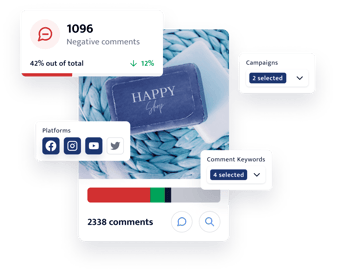
How Social Media Comments Impact Sales: 14 Important Stats
Social media has become a key channel for brand discovery and driving meaningful customer relationships. Brand conversations can be a powerful source to increase brand advocacy, build trust, and influence purchase decisions. However, social media engagement isn't always positive. Unchecked trolling, toxic remarks and harmful comments can damage your brand's reputation and negatively impact business revenue. Quantifying the impact of negative comments can be a bit complex, but ignoring these comments or reacting too late can escalate an issue, cause a PR crisis even, and swamp sales.
Need to convince your team of the importance of taking a proactive approach to managing your brand's engagement on social media? Is it worth investing resources into social listening and monitoring? Arm yourself with these powerful stats to prove that social media comments impact sales.
How does negative comments affect sales in social media
“Negativity bias” is a notion proposed by psychologists Paul Rozin and Edward Royzman, which explains why something very positive will generally have less of an impact on a person's behavior and cognition than something equally emotional but negative. But what does the negativity bias mean for brands on social media?
1.
Negative information is 63% more likely to be clicked on than positive information. This means that social media algorithms are designed to maximize such signals and are bound to spread negative information. (AdWeek)
2.
94% of consumers say a bad review has convinced them to avoid a business. (ReviewTrackers)
 |
3.
|
4.
48% of the 9000 respondents to the 2021 Edelman Trust Barometer survey say it’s a brand’s fault if their advertising appears next to hate speech, violent, or sexually inappropriate content.
(Edelman)
1 in 3 businesses feels that negative social media posts
are the greatest threat to their reputation.
(Igniyte)
6.
46% of social media users said that they called out brands on social media.
(MarketingCharts)
The impact of customer reviews on sales
Customer reviews used to be limited to specific platforms or dedicated sections of Facebook and Google. However, today’s consumers don’t hesitate to leave their impressions of a product or service in the comments section of your ads and posts. Social media comment feeds are a treasure trove of information and opinions about your brand.
The challenge is to sift through the volumes of comments across different posts, ads, and platforms to highlight the positive reviews amid all the noise and spam.
7.
93% of consumers say online reviews impact purchase decisions.
(Podium)
8.
81% of U.S. online consumers’ purchase decisions are influenced by their friends’ social media posts versus 78%, who are influenced by the posts of the brands they follow on social media. (Forbes)
9.
When considering a new business, 91% of people think reviews are important enough to sway their purchasing decision.
(Sitejabber)
10.
|
 |
11.
80% of consumers say they trust online reviews as much as personal recommendations. (BrightLocal)
Why brands should monitor and manage social media conversations
Nowadays, people actively seek out comments about brands, products, or services on social before making purchase decisions. In fact, many people at the consideration stage leave comments that can easily be responded to push the user forward to making a decision and increasing conversions —this a massive opportunity for brands to engage actively and drive meaningful conversations.
 |
12.
|
13.
A personalized response can bring back 51% of your customers who had negative experiences. (Sitejabber)
14.
44% of people think that brand conversations (what a brand says in direct communication over email, direct messaging, or in response to a comment posted) are more persuasive than what a brand says in its advertising materials. (Edelman)
As these stats show, people are influenced by what others say about your brand or product on social media. Not only does this directly impact shopping behavior, but it also affects your brand reputation and credibility. However, not all reviews are fair or authentic. Your brand may be attacked unfairly, or false information may be spread about your products, services, spokespersons, and company. Moderating these unjustified brand-damaging comments is crucial to ensure consumers get reliable information about your brand. Leaving these comments visible on your social media accounts is like allowing graffiti to be sprayed all over your storefront and not doing anything about it.
Your brand can drive meaningful engagement by actively monitoring and managing social media comments, resulting in better brand credibility, ROAS, and increased sales.

Start managing your social media comments effortlessly
Facebook, Instagram, Youtube, Twitter Ads & Organic coveredSTART FREE TRIAL